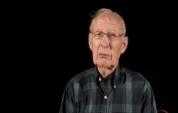4:52 | The trip overseas was long for many ships who needed to avoid German U-Boats, but Charles Mahaffey was able to go to Europe about the Queen Mary, one of the fastest ships in the Atlantic. While in England, they would prepare for the eventual invasion of mainland Europe. Moving men over the channel is one task, but moving their anti-aircraft guns would be another difficult endeavor. (This interview made possible with the support of JOSEPH MANN.)
Keywords : Camp Polk Queen Mary Camp Shanks Quonset hut cold preparation battery 40mm gun anti-aircraft (AA)

Charles Mahaffey was one of many men to go through the Army's basic training program. Many who finished early would end up fighting on the beaches in Italy, but Charles thought he had a bit of luck and ended up training with an anti-aircraft artillery battalion. (This interview made possible with the support of JOSEPH MANN.)
Charles Mahaffey briefly describes his involvement during the Battle of the Bulge where his battalion was tasked with provided anti-air support for the struggling American forces. One of the biggest threats for all was the biting, December cold of Northern Europe. (This interview made possible with the support of JOSEPH MANN.)
The Battle of Remagen was a big turning point in the march to Berlin. The Rhine River served as a natural impediment to America's progress, and the Germans would try desperately to destroy the last remaining bridges. Charles Mahaffey recalls being one of the first anti-aircraft groups to cross the bridge, as well as returning to Remagen many years later. (This interview made possible with the support of JOSEPH MANN.)
The German forces were scattered as the Americans made their way into Germany, and Charles Mahaffey recalls how they would combat them as they approached the towns along the way. (This interview made possible with the support of JOSEPH MANN.)
By the end of the war, everyone was getting a new assignment as the troops were able to start cycling back home. Charles recalls how he felt being back in the states and seeing his family once again. (This interview made possible with the support of JOSEPH MANN.)